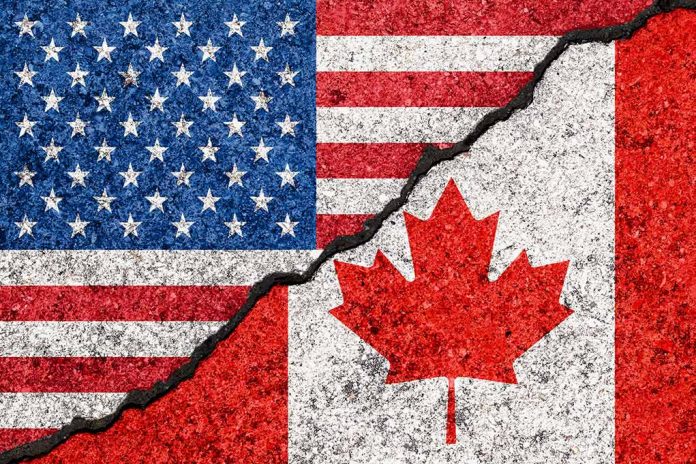
President Trump’s tariffs on Canada, Mexico, and China spark retaliatory measures, threatening a global trade war.
Key Takeaways
- President Trump imposed tariffs on imports from Canada (25%), Mexico (25%), and China (10%).
- Canada announced retaliatory 25% tariffs on $155 billion worth of U.S. goods.
- The U.S.-Canada border facilitates over $2.5 billion in daily trade, potentially impacting both economies.
- Trudeau warned of job losses and increased costs for U.S. consumers due to these tariffs.
- The tariffs could exacerbate existing economic challenges, including housing shortages and COVID-19 impacts.
Trump’s Tariff Initiative Sparks International Response
President Donald Trump has signed executive orders imposing tariffs on imports from Canada, Mexico, and China, citing concerns over the U.S. trade deficit and the import of fentanyl. The move imposes a 25% tariff on imports from Mexico and Canada, with a 10% tariff on Canadian energy imports, and a 10% tariff on Chinese goods. This action has prompted immediate retaliation from Canada, escalating trade tensions between long-standing allies.
Canadian Prime Minister Justin Trudeau announced retaliatory measures, imposing a 25% tariff on C$155 billion ($107 billion) worth of U.S. goods. The initial phase will affect C$30 billion of imports immediately, with the remainder taking effect in 21 days. These counter-tariffs target a wide range of American products, including beer, wine, bourbon, fruits, clothing, sports equipment, and household appliances.
WATCH: Canada retaliated against Donald Trump’s new tariffs with 25% levies on many US imports https://t.co/g6ri0v4ycW pic.twitter.com/SGzSPll6Q7
— Reuters Asia (@ReutersAsia) February 2, 2025
Economic Implications and Warnings
The implementation of these tariffs could have far-reaching consequences for both nations. With daily trade flows exceeding $2.5 billion across the U.S.-Canada border, the potential for economic disruption is significant. Prime Minister Trudeau has issued stark warnings about the impact on American jobs and consumers.
“Tariffs against Canada will put your jobs at risk, potentially shutting down American auto assembly plants and other manufacturing facilities” stated Justin Trudeau. The Canadian leader also cautioned about increased costs for everyday items, stating, “They will raise costs for you, including food at the grocery store and gas at the pump.” These tariffs could exacerbate existing economic challenges, such as housing shortages and the ongoing impacts of COVID-19 on sales and employment.
Broader Implications and Additional Measures
Beyond the immediate economic impact, this trade dispute threatens to strain the historically close relationship between the United States and Canada. Trudeau emphasized the long-standing partnership between the two nations, reminding Americans of their shared history and mutual support. “From the beaches of Normandy to the mountains of the Korean Peninsula, from the fields of Flanders to the streets of Kandahar, we have fought and died alongside you during your darkest hours. We’ve built the most successful economic, military and security partnership the world has ever seen.”
Canada is also considering additional non-tariff measures related to critical minerals and energy procurement. Trudeau encouraged Canadians to support domestic products and tourism, signaling a potential shift in consumer behavior that could further impact trade relations. Despite the escalating tensions, the Canadian Prime Minister maintained a firm stance, stating that while Canada did not seek this conflict, it will not back down.
Domestic and International Reactions
The move has drawn criticism from various sectors within the United States, including the United Steelworkers union and the U.S. Chamber of Commerce. These groups have expressed concern about the potential negative impacts on industries reliant on imports and the broader economic consequences of a trade war.
As the situation continues to develop, both nations face the challenge of navigating this complex economic landscape while maintaining their crucial alliance. The coming weeks will be critical in determining whether diplomatic efforts can ease tensions and prevent further escalation of this trade dispute.
Sources:
Trudeau answers after Trump imposes tariffs on goods from Canada, China and Mexico
Canada announces retaliatory tariffs on long-time ally US







